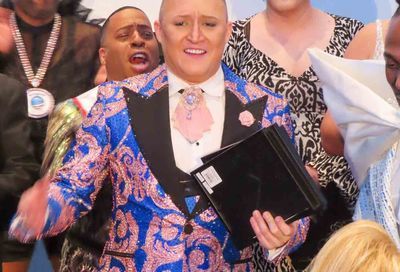Heart of Darkness
''Voodoo Macbeth'' touches, with rawness and relevance, on all that is unsettled about humans at war
Another standout, even if his initial closeness to Macbeth is not as defined in this adaptation as it could be (and thus the agony of his betrayal lessened) is Frank Britton’s Banquo. Giving his man a stoic yet canny cast in life, once a ghost, Britton’s Banquo has a fascinating charisma. Understated yet with eyes that bore into Macbeth, Banquo leaves an impression that lingers long after his ghost departs. Another actor at home with the language, Britton brings the kind of credible urgency that makes one forget that it was written some 400 years ago.
As Macbeth’s nemesis Macduff, Christopher Dwyer is full of promise. Showing good facility with the language, there are times when Dwyer delivers with much pleasurable pace and rhythm, others when he gets a little out of synch, although never fatally. His energy is also intact and he delivers it well in the pivotal scene in which he learns that Macbeth has ordered the slaughter of his family, even if greater experience will bring him a more poignant texture. As Hecate, William Hayes offers a striking presence with his neo-Nazi-esque look and offers a smooth and effective physicality. Nicely assertive yet understated, further vocal development and more experience with the language will allow these strengths to converge. Delivering his Shakespeare rather like Welles’s players – in natural voice – Ryan Sellers engages with an unfussy, almost filmic Malcolm; exuding a confidence that works well in intimate theater. Providing some amusing moments and, with Sellers, an effectively executed death, Cyle Durkee offers an easygoing Porter and some quirky, low-key comic turns.



To April 13
$25-$40
The American Century Theater
Gunston Arts Center
Theater II
2700 South Lang St.
Arlington
www.americancentury.org
703-998-4555
Harder to quantify is Matt Dewberry’s Gruoch. Requiring a mix of pushiness, madness and generally odd behavior, but devoid (thanks to Welles’s adaptation) of Lady Macbeth’s driven continuity, this is a challenging role. Not surprisingly, Dewberry tries for a careful delineation of Gruoch’s varying moods, but it results in some exaggeration. Although he brings much energy to this unsettled mind, a bit less would be a lot more.
But young players or not, this is a production to be seen as an astute take on Welles’s own radical interpretation. It isn’t likely to shock as his did, but it does touch, with rawness and relevance, on all that is unsettled about humans at war. And who can shock a 21st century audience anyway?
Support Metro Weekly’s Journalism
These are challenging times for news organizations. And yet it’s crucial we stay active and provide vital resources and information to both our local readers and the world. So won’t you please take a moment and consider supporting Metro Weekly with a membership? For as little as $5 a month, you can help ensure Metro Weekly magazine and MetroWeekly.com remain free, viable resources as we provide the best, most diverse, culturally-resonant LGBTQ coverage in both the D.C. region and around the world. Memberships come with exclusive perks and discounts, your own personal digital delivery of each week’s magazine (and an archive), access to our Member's Lounge when it launches this fall, and exclusive members-only items like Metro Weekly Membership Mugs and Tote Bags! Check out all our membership levels here and please join us today!



















